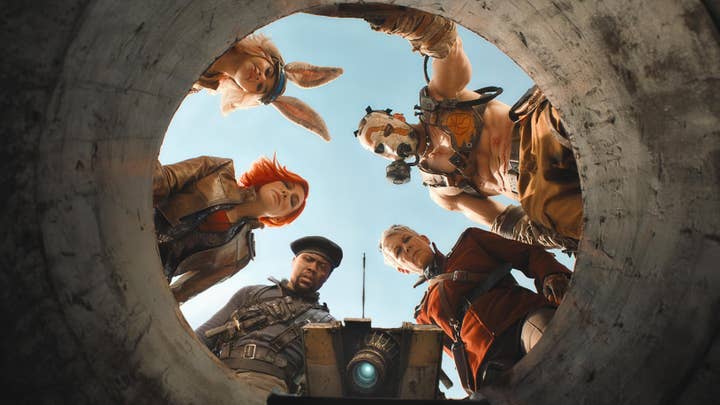Skybound foresees a decade-long surge in the convergence of video games with both television and cinematic productions
The entertainment industry is currently witnessing a surge in adaptations of popular video game franchises for both large and small screens.
The Super Mario Bros Movie recently became the third highest-grossing animated film of all time, only surpassed recently by Inside Out 2. Similarly, TV series such as Fallout and The Last of Us have captivated millions, and Sonic The Hedgehog 3 is poised to continue its predecessors’ success upon its release this holiday season. Adding to the trend this week is the launch of the Borderlands movie.
David Alpert, CEO and co-founder of Skybound, the company behind The Walking Dead, believes this trend signifies more than just a fleeting interest. "Similar to how Spider-Man's 2002 release sparked twenty years of notable comic book adaptations, we could see a five to ten-year golden era for video game adaptations," Alpert told GamesIndustry.biz.
Alpert explained that historically, video game adaptations were often subpar, citing examples like the original Street Fighter, Super Mario Bros., and Doom movies. Hollywood's perceptions have shifted due to two key developments: the evolving depth and storytelling of video games and significant technological advancements in film and TV production.
Discussing this technological evolution, Alpert highlighted that what was once the standard in films like Jurassic Park—featuring around 600 special effects shots—is now commonplace in a single episode of a TV series, illustrating the dramatic advancements in production capabilities.
Alpert pointed out Fallout as a prime example of a successful game-to-TV adaptation, praising its faithfulness to the source material and its quality as a standalone show. He contrasted this with the Super Mario Bros Movie, which, despite its commercial success, he didn't find personally compelling. Alpert remains optimistic about seeing a game adaptation reach the cinematic heights of a film like Dune.
Skybound has consistently ventured into adapting properties across different media, notably with its successful transformations of the comic series The Walking Dead and the animated superhero show Invincible. The increasing initiative by video game companies to expand their IPs into other entertainment forms reflects a significant shift in the approach of film and TV industries.
"When Jon [Goldman], Robert [Kirkman], and I first proposed creating movies and TV shows from comics and video games over two decades ago, the industry was not receptive," Alpert recalls. "Today, the landscape has changed, and our approach has gained acceptance."

Given Skybound's history, we inquired about the challenges and strategies for adapting video game IP into other media. While it's generally more straightforward to convert the narrative and characters of a book or comic into a film or series, the transition from an interactive medium like video games to a passive one carries its own set of challenges.
Jon Goldman, co-founder of Skybound, emphasized that the success of such adaptations isn't formulaic. He noted that The Walking Dead was already a well-established comic series before becoming a hit TV show, laying a solid foundation for adaptations into other entertainment forms. He advises developers to prioritize creating compelling games before considering other media opportunities.

Goldman tells GamesIndustry.biz that focusing entirely on creating an exceptional game is crucial. "Without an outstanding game, trying to pitch a TV show is futile. Successful games attract partners and sell in large numbers, which is necessary before expanding into other media."
Alpert adds that companies should stop viewing adaptations as secondary marketing tools. "You can't consider adaptations as ancillary; everything should be treated as primary. A great show needs to match the quality of the game, and vice versa, to avoid disappointing fans and securing viewership."
Screen adaptations can serve as significant marketing tools for video games, as seen with the resurgence in sales of older Fallout titles following the success of the Amazon Prime Video series, and a similar trend with Mario games tied to the Nintendo movie. However, no company has yet synchronized a new game release with its film or TV show, potentially missing out on a lucrative opportunity.
"I don't think game companies are overly concerned with synchronizing releases," Goldman comments. "The gaming industry already generates substantial revenue. In many cases, the largest titles in gaming today are ongoing live-service or multiplayer experiences, which lack a specific release date to align with a movie or show launch."
Gaming adaptations not only enhance game sales but also highlight the unique business model in the gaming industry, which Goldman refers to as “unbound.”
"In games, you can have users who spend nothing or those willing to pay thousands over a year," Goldman explains. "This flexibility contrasts with the fixed subscription model dominating TV, film, and music, which pressures content creators."
"If you don't make an awesome game, then TV partners probably won't want to work with you"
Jon Goldman, Skybound
While subscription services like Xbox Game Pass and Apple Arcade are gaining popularity in gaming, they haven't reshaped the industry as profoundly as similar models have transformed TV, film, and music. Goldman suggests that although Microsoft's ability to sustain losses may support its subscription offerings, other game companies face different economic pressures when funding live-service games.
"The financial dynamics of live-service games mean they require ongoing investments, unlike the fixed production costs of film or TV series," Goldman says. "While a successful subscription model in games could impose similar pressures on developers, a rapid industry-wide transition seems unlikely due to these differences."